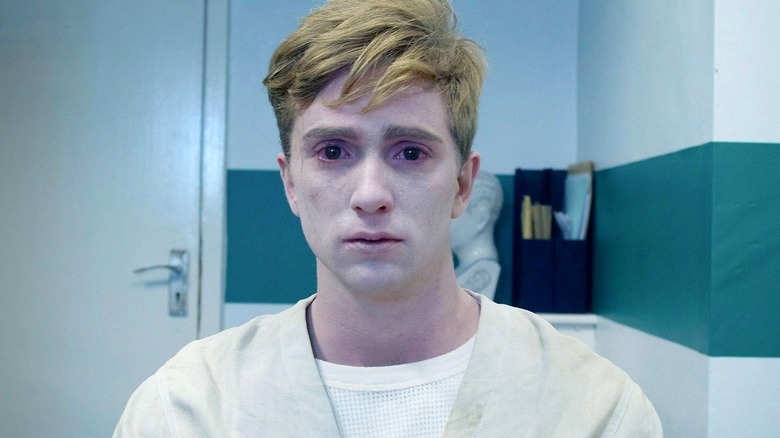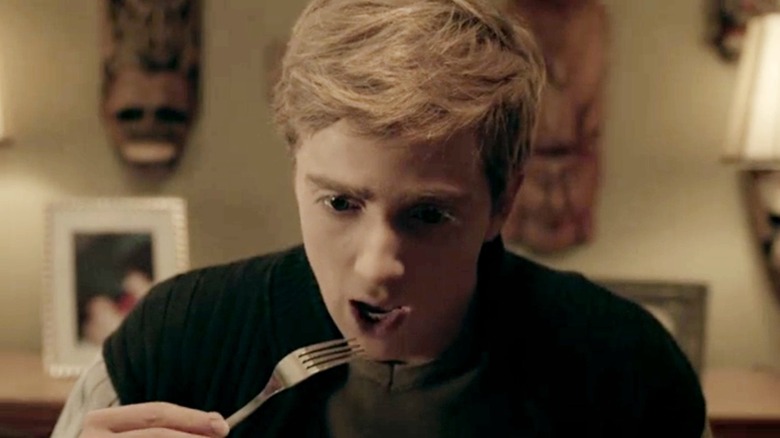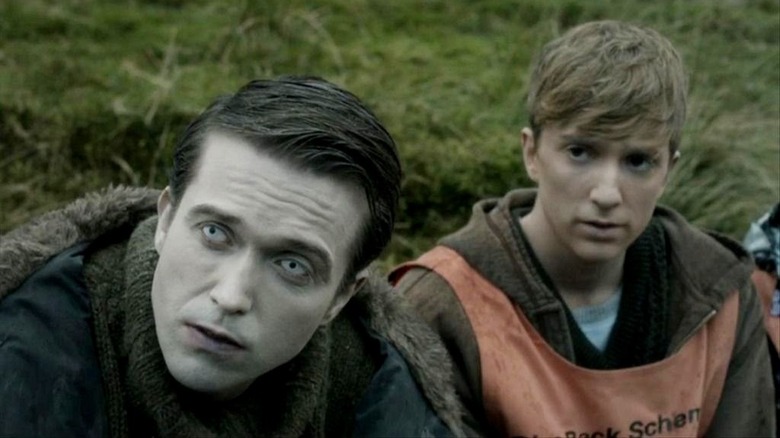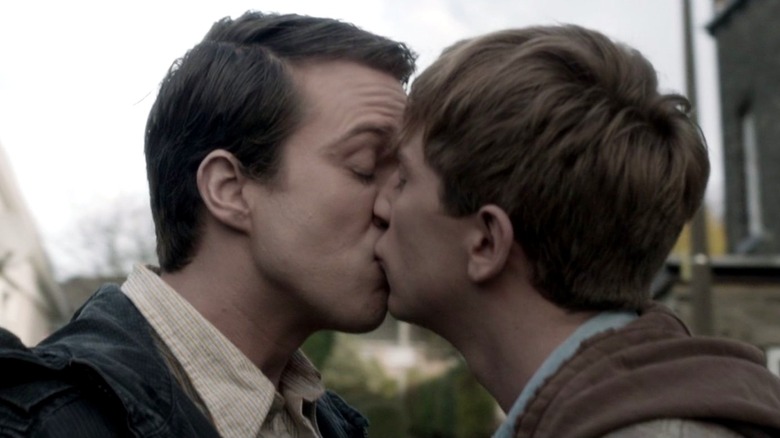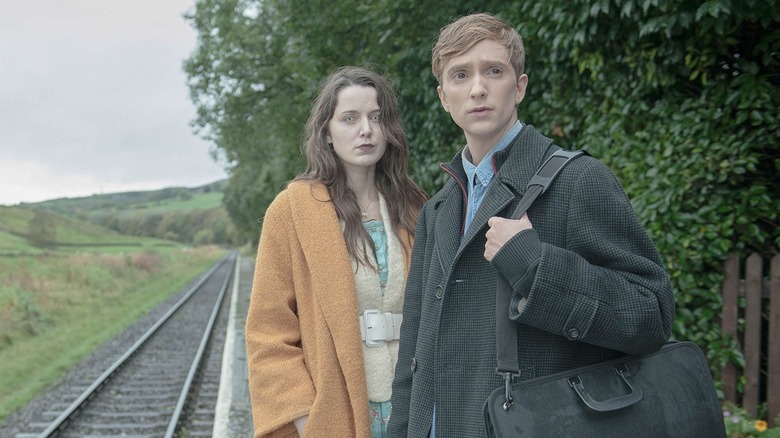TV, Interrupted: Post-Zombie Apocalypse Series In The Flesh Was Buried Too Soon
(Welcome to TV, Interrupted, a series where the /Film team remembers, eulogizes, and makes a case for the revival of TV shows we loved that were canceled far too soon.)
Post-apocalyptic stories have never been more popular ... but what about the post-post-apocalypse? What happens when the world has fallen apart temporarily, and been put back together in a slightly new shape? How do you get back to normal? And is it even desirable to do so?
It's a question a lot of us have had to ask ourselves recently. Two years ago I was standing in line for the local pharmacy on an eerily empty main street, all non-essential businesses quiet and dark. Per social distancing guidelines, there was six feet of distance between each person, such that the line stretched out and around the corner. Masks were ubiquitous by this point, even outside. It felt distinctly apocalyptic, and even after returning to relative normality the world still feels unstable, like it could fall apart again at any moment.
Such is the atmosphere of "In the Flesh," a supernatural drama series that ran for just nine episodes on BBC Three. The story takes place in the aftermath of "The Rising," an event in which tens of thousands of people rose from the dead as zombies and turned the U.K. into "28 Days Later" for a while.
With the advent of a medical treatment for the undead that restores brain function and curbs their rabid behavior, "Partially Deceased Syndrome sufferers" are given legal protection and plans are laid to reintegrate them into society. But most residents of the small town of Roarton find the idea of accepting "rotters" into their midst abhorrent, and protagonist Kieren Walker (Luke Newberry) quickly realizes that returning to life means returning to a world that hates and fears him.
Why In the Flesh was great
Zombies aren't the first thing you'd associate with the distinctly British genre of kitchen sink dramas, but "In the Flesh" works perfectly by guessing that British people would probably deal with the post-zombie apocalypse the same way we deal with all other uncomfortable topics: by not talking about them.
Even as he is plagued by visions of killing people and eating brains while in his pre-medicated state, the doctor-prescribed treatment for Kieren's trauma is to dissociate from it completely. After bluntly stating "I'm a zombie, and I killed people," he is corrected and forced to recite the mantra: "I am a Partially Deceased Syndrome sufferer, and what I did in my untreated state was not my fault."
In group therapy, he stumbles over the approved phrasing while trying to express the enormity of the horror and guilt he feels. Among his fellow PDS sufferers, there seem to be only two acceptable views: either they are entirely innocent and not accountable for anything they did while rabid, or they were justified in killing because there was a war between the living and the dead, and they were in "survival mode." There's no room for Kieren's guilt among either group. Ahead of his release from the treatment center, he's given makeup and colored contact lenses so that he can appear "normal" in public. The great machine of British culture and politics is keen to paper over the whole zombie issue. Keep calm and carry on.
When Kieren goes home, things become even more absurd as his parents create a desperate veneer of normality. Kieren is gay, and died by suicide after his boyfriend was killed in Afghanistan. Along with these facts, his undead state becomes just another taboo topic that he's expected to stay quiet about. Instead of telling Kieren that he can't leave the house because his neighbors might murder him, his dad cheerfully tells him about all the board games and DVDs they've bought to keep him entertained. When Kieren tells his mother he can't eat food any more, she asks him to "pretend," and he's forced to pantomime cutting up the food and eating it. His parents bring him cups of coffee that he can't drink. And when prospective buyers come to view the house, Kieren's father literally shoves him into the closet.
Of course, not everyone is willing to play along, especially in Roarton. Outside of the politically correct pamphlets handed out to PDS sufferers and their families, the undead are derided as "rotters" by people still reeling from the horrors of the Rising. In lieu of frank discussion there is extremism, hate, and fear. The recent societal collapse has primed Britain for further unrest and full-blown fascism. Kieren watches as his undead neighbor, an elderly woman, is dragged from her home and executed in the street in front of her sobbing husband. When he tries to broach the subject of the "crazy night" to his parents the next morning, his father agrees that it was a crazy night ... of weather, and turns the topic of conversation to rainfall and drainage.
Why In the Flesh was canceled
It's a known fact that, especially compared to the mammoth 24-episode seasons of many American TV shows, British television leans much more towards brevity. Even "Sherlock," the modern Holmes adaptation starring Benedict Cumberbatch and Martin Freeman that became a worldwide phenomenon, only managed a grand total of 13 episodes. "In the Flesh" got as far as two seasons, and a grand total of nine episodes.
It wasn't that the show wasn't popular. It premiered to 668,000 viewers, a very respectable number given the lack of star power attached to it, and by the second season finale there were still more than half a million people tuning in. It also won the BAFTA for Best Mini-Series in 2014. But sadly, "In the Flesh" fell prey to budget cuts as BBC Three transitioned from a live broadcast channel to online-only. Breaking the news of the show's cancellation, BBC Three stated:
Given there is only budget for one original drama series a year on the channel it won't be returning. We loved the show but have to make hard choices to bring new shows through and create room for emerging talent. Huge thanks to the Bafta award-winning writer Dominic Mitchell and the superb cast.
The loss of a series that was beloved by fans was part of a larger trend towards the decline of British television and film in the wake of the 2007/08 financial crisis. Government austerity measures picked away at funding for the arts piece by piece, and the decline of households with TV licences bit away at the BBC's budget.
Had the cards fallen slightly differently, there's a good chance that "In the Flesh" would have been snapped up by Netflix as part of the streamer's great content boom. The similarly popular and similarly critically-acclaimed U.K. series "Black Mirror" was canceled at around the same time by Channel 4. That might have died a similar death had the first two seasons not released on Netflix in the United States, where its newfound popularity sparked a bidding war for future seasons that Netflix ultimately won. Channel 4 also threw its hat into the ring to recommission "Black Mirror" after its success skyrocketed, but by then it was too late; the U.K. network was in no position to outbid a streaming giant.
Unfinished business
Watching "In the Flesh" again in 2022, it's uncanny how prescient the series was. Though Roarton becomes more accepting of PDS sufferers in the second season, the wider stage of politics also undergoes a reversal from protecting the undead to persecuting them. An MP called Maxine Martin (Wunmi Mosaku, who went on to star in the Disney+ series "Loki") arrives in town as the representative of the Victus party, which is staunchly pro-living and conceals bigotry towards the undead beneath dog whistle rhetoric.
Maxine institutes a travel ban for the undead, preventing them from leaving Roarton. In place of reassurances that PDS sufferers were not responsible for any horrors they committed in their rabid state, she introduces a "Give Back" scheme that provides them with the "opportunity" to restore their passports with newly-required certificates by carrying out community service. Essentially, the undead are being converted into a source of free labor. They're dehumanized and treated as second class citizens, not just by their bigoted neighbors, but in the eyes of the law as well.
As it so often does, oppression stokes the fires of rebellion and extremism among the partially-deceased population of Roarton, particularly when one of the leaders of the undead liberation movement arrives in town: Simon Monroe (Emmett J. Scanlan). His charisma and beliefs draw a crowd, including Kieren's best friend Amy (Emily Bevan), and Kieren makes a connection with him too. A troubled romance blooms between them, as Kieren tries to maintain peace amid the unrest and Simon pushes to lead a Second Rising.
"In the Flesh" season 2 ends with some tantalizing reveals about the nature of Partially Deceased Syndrome sufferers and what the future might hold for them, and without spoiling it too much, it has a hell of a finale that left fans wanting more. There's no doubt at all that this show was canceled before the story was complete.
Could In the Flesh ever return?
After years of efforts to get "In the Flesh" picked up again for a third season on TV, creator Dominic Mitchell this year decided to take the ideas that had been percolating since its cancellation and turn them into a "fantasy" season 3. There's a GoFundMe campaign to support his efforts in writing scripts that continue the story, which will then be shared (in part or in whole) online. Mitchell recently finished drafting the script for the first episode of this third season, with plans for a one-off podcast featuring the original cast and crew.
So, "In the Flesh" will get an ending of sorts, even if there are unfortunately no signs of it returning to our screens as a TV show. If you're in the U.S. and are interested in watching this unique take on the zombie genre, "In the Flesh" is currently available for free (with ads) on Tubi, and can also be watched on Hulu or purchased from VOD platforms like Amazon, iTunes, and Vudu.
